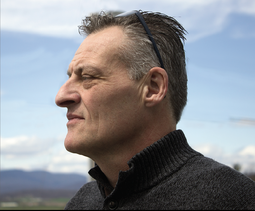|
Former resident, Charlie Ferguson, talks about his time at Gemeinschaft Home as a turning point—one in which he could imagine a life beyond incarceration.  When Charlie Ferguson arrived at Gemeinschaft Home for the first time in the Summer of 2016, he “was overwhelmed with peace and happiness,” joking that the old Victorian home looked more like a country bed and breakfast than a house where formerly incarcerated men lived. The setting has remained a steady, calming factor in Ferguson’s life ever since his arrival, providing a way for him to refocus. “Sure, I have problems, and things still bother me, but when I go out on that porch and look across that field with the cows and the mountains, things seem to be all right.” Originally from Danville, Virginia, Ferguson had spent a large portion of his life incarcerated, in a destructive cycle of behaviors that all but guaranteed he would never leave prison for long, a reality that gradually became clearer to him as neared age 50. “At the end of my incarceration, either I make the decision to deal with this or I am going to live the rest of my life in prison,” he explains, “So, I chose to deal with it.” Ferguson had heard about the Gemeinschaft Home program through other inmates and decided to take a pro-active approach by reaching out to the re-entry specialist at the facility where he was incarcerated and eventually sending off the application materials himself. He arrived at ready to make progress, and quickly established a relationship with former program director Richie Yowell, who guided his progress throughout the program. For the first time in his life, Ferguson began to look back at his life experience, his struggles with addiction, and he came to a significant realization. “When you are looking at people with alcohol addictions or drug addictions or whatever kind of addiction you have, that’s just the surface of the problem,” he says, pointing out, “In order to deal with it, you have to face the reality that you need to get to the root of the problem. And the root of my problem was my father’s death. I just kept suppressing it, and I never wanted to deal with it.” Without a dependable support system, Ferguson recognized early-on that the tools he would need to survive on is own, to remain substance free, and to stay out of prison were available to him at Gemeinschaft Home. “I came here with no family—nothing—and if I left here with nothing, then that’s where I was at, because I had nothing else. I had to depend on me,” he recounts. Ferguson started working during his second week in the program, going full-time after thirty days, and he has been working with the same company (LSC Communications) ever since. He paid off thousands of dollars in court fees/fines, and he purchased a truck, which he paid for in cash. Such progress has given him confidence to continue working toward a productive, responsible life, and to share his past experience with others. After completing the 90-day program, Ferguson expected to go back to Danville, but decided instead to remain in Harrisonburg and continue working at LSC. Living next door to Gemeinschaft Home, Ferguson regularly visits with the staff and residents, and has recently discovered a talent and passion for mentoring, particularly among the younger residents. “I have walked hundreds of miles in their shoes already,” he says, which gives him unique insight into the challenges they face, and he is committed to furthering the Gemeinschaft Home mission that enabled him to change the direction of his life forever. Comments are closed.
|
Archives
August 2023
|